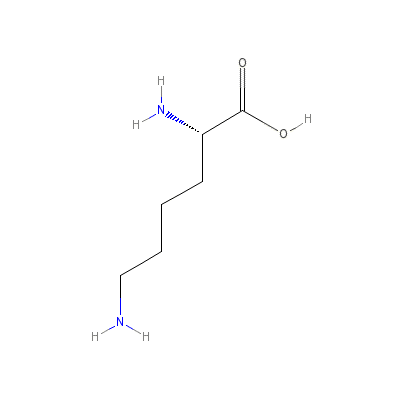2,6-diaminohexanoic acid




2,6-diaminohexanoic acid Brand names, 2,6-diaminohexanoic acid Analogs
2,6-diaminohexanoic acid Brand Names Mixture
- No information avaliable
2,6-diaminohexanoic acid Chemical_Formula
C6H14N2O2
2,6-diaminohexanoic acid RX_link
No information avaliable
2,6-diaminohexanoic acid fda sheet
2,6-diaminohexanoic acid msds (material safety sheet)
2,6-diaminohexanoic acid Synthesis Reference
No information avaliable
2,6-diaminohexanoic acid Molecular Weight
146.189 g/mol
2,6-diaminohexanoic acid Melting Point
224 oC
2,6-diaminohexanoic acid H2O Solubility
appreciable
2,6-diaminohexanoic acid State
Solid, white crystalline powder
2,6-diaminohexanoic acid LogP
-2.926
2,6-diaminohexanoic acid Dosage Forms
Capsule, powder, tablets
2,6-diaminohexanoic acid Indication
Supplemental L-lysine has putative anti-herpes simplex virus activity. There is preliminary research suggesting that it may have some anti-osteoporotic activity.
2,6-diaminohexanoic acid Pharmacology
Insures the adequate absorption of calcium; helps form collagen ( which makes up bone cartilage & connective tissues); aids in the production of antibodies, hormones & enzymes. Recent studies have shown that Lysine may be effective against herpes by improving the balance of nutrients that reduce viral growth. A deficiency may result in tiredness, inability to concentrate, irritability, bloodshot eyes, retarded growth, hair loss, anemia & reproductive problems.
2,6-diaminohexanoic acid Absorption
absorbed from the lumen of the small intestine into the enterocytes by an active transport process
2,6-diaminohexanoic acid side effects and Toxicity
No information avaliable
2,6-diaminohexanoic acid Patient Information
Pregnant women and nursing mothers should only consider using supplemental L-lysine if their diets are low in this amino acid. They should avoid supplemental L-lysine for other reasons. Proteins such as casein, which are high in L-lysine relative to L-arginine, are associated with elevated cholesterol levels. Those with hypercholesterolemia who are interested in taking supplemental L-lysine should be aware of this. Those with hepatic or renal failure should exercise caution in the use of supplemental L-lysine.
2,6-diaminohexanoic acid Organisms Affected
Humans and other mammals














